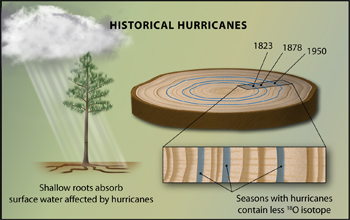News Release 06-131
Tree Rings Provide a 200-Year-Old Hurricane Record
Information extends analyses of weather cycles, human impact

Oxygen isotopes in tree-rings can record hurricane activity up to 400 years ago.
September 19, 2006
This material is available primarily for archival purposes. Telephone numbers or other contact information may be out of date; please see current contact information at media contacts.
Scientists have shown that an age-old "database"--tree rings--contains surprisingly accurate information about hurricane activity that occurred hundreds of years ago. By measuring different chemical forms of oxygen present in the rings, researchers identified periods when hurricanes hit areas of the Southeast more than 100 years before modern records were kept.
The technique allows scientists to extend from decades to centuries the time-frames of intense hurricane cycles and may help determine if the increase in the number of hurricanes hitting the Southeast since the mid-1990s is part of a regularly occurring cycle or due to causes such as global climate change.
Their research is being published in the Sept. 18, early online edition of the Proceedings of the National Academy of Sciences. It was funded by grants from the National Science Foundation and the University of Tennessee (UT).
To read the UT news release, go to http://www.tennessee.edu/news/article.php?id=3833.
-NSF-
Media Contacts
Jay Mayfield, University of Tennessee, (865) 974-2225, email: jay.mayfield@tennessee.edu
Leslie Fink, National Science Foundation, (703) 292-5395, email: lfink@nsf.gov
Principal Investigators
Claudia Mora, University of Tennessee, (865) 974-2366, email: cmora@utk.edu
Co-Investigators
Henri Grissino-Mayer, University of Tennessee, (865) 974-6029, email: grissino@utk.edu
The U.S. National Science Foundation propels the nation forward by advancing fundamental research in all fields of science and engineering. NSF supports research and people by providing facilities, instruments and funding to support their ingenuity and sustain the U.S. as a global leader in research and innovation. With a fiscal year 2023 budget of $9.5 billion, NSF funds reach all 50 states through grants to nearly 2,000 colleges, universities and institutions. Each year, NSF receives more than 40,000 competitive proposals and makes about 11,000 new awards. Those awards include support for cooperative research with industry, Arctic and Antarctic research and operations, and U.S. participation in international scientific efforts.
Connect with us online
NSF website: nsf.gov
NSF News: nsf.gov/news
For News Media: nsf.gov/news/newsroom
Statistics: nsf.gov/statistics/
Awards database: nsf.gov/awardsearch/
Follow us on social
Twitter: twitter.com/NSF
Facebook: facebook.com/US.NSF
Instagram: instagram.com/nsfgov


